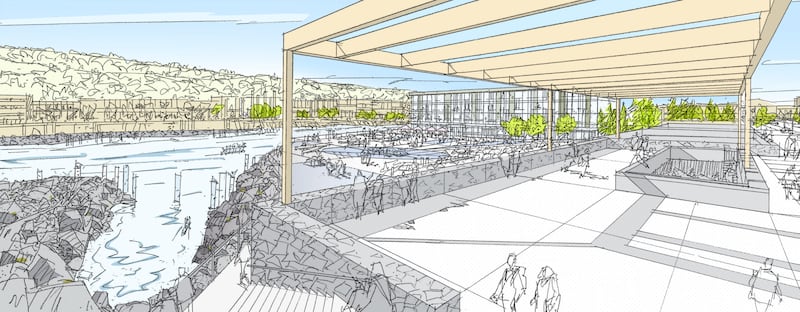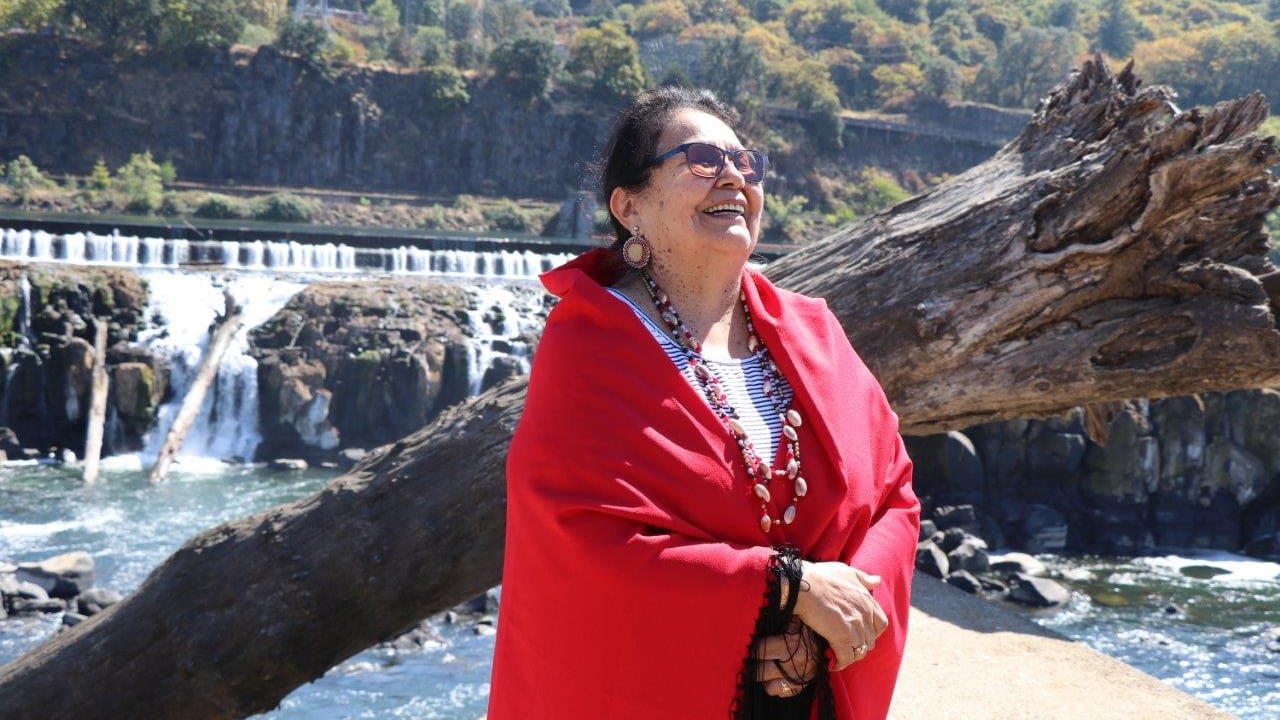Every second, 30,849 cubic feet of water plunge over the edge of Willamette Falls. Among American waterfalls, that’s second in volume only to Niagara, even though the signature falls on the Willamette River is 130 feet shorter.
Another difference: You can visit Niagara Falls.
Willamette Falls is a lot harder to reach, or even see. The best views of the cascade come from a bus stop outside Oregon City, or aboard a tour boat floating at its base. There’s no overlook where visitors can get close to the natural wonder.
For years, such a destination has been promised—only to be washed away in a statewide conflict between government agencies and Oregon’s nine Indigenous tribes.
Last week offered the latest tantalizing clue of how that logjam could break.
The Confederated Tribes of Grand Ronde announced a name for its 23-acre property alongside the falls: “Tumwata Village.”
What’s in a name? Quite a bit. In 2019, the tribe bought the former Blue Heron paper mill for $17 million, securing a piece of real estate with huge cultural and economic worth. The mill site is especially valuable as the Grand Ronde seeks to diversify its economic base, which is almost entirely dependent on its casino, Spirit Mountain.
In March, the Grand Ronde pulled out of a partnership with regional government Metro, Oregon City, Clackamas County and the State of Oregon, who had agreed to build a riverwalk along the falls. (Four other Indigenous nations were in discussions to join the partnership.) The ownership of the Blue Heron site now gives the Grand Ronde the ability to act alone—and a significant advantage over other tribes that claim historical legal rights in the Portland metro area.
That’s why the announcement of the Tumwata Village name, accompanied by the release of drawings that show a plaza, shopping district and hotel, is far more than a typical press release: It’s a sovereign nation jockeying with other Indigenous nations and several layers of regional government over what commerce along the waterfall will look like. As WW has previously reported, the stakes are high: Poverty is endemic on Oregon reservations, and the nearest casino to Portland, Ilani, is operated by the Cowlitz tribe in Washington state (“Fish Story,” WW, Sept. 12, 2018).
In interviews last week timed to the announcement, chairwoman Cheryle A. Kennedy said the Grand Ronde has no intentions of building a casino next to Willamette Falls.
This week, in a video conversation, WW asked her why not.

WW: What language is Tumwata? Is it Chinook jargon?
Cheryle A. Kennedy: Not necessarily. The name came from the people that occupied the area millennia ago. And so they are part of the Willamette Falls people, part of the Clowewalla tribe and the Clackamas people. It predates the trade language. It’s just the name of the people that were there.
What is the historical and ceremonial purpose of the falls to tribes and bands within the Grand Ronde?
It was a place of subsistence. It was a place of gathering. It was a place of ceremony. It was a place of commerce. So it has thousands of years of history as being possibly one of the most robust places of commerce west of the Mississippi for tribal people. The Europeans who came as explorers and travelers witnessed the abundance of the falls in the amount of fish that lived there.
So, historically, it’s a fishing site?
Yes.
Will the village as planned include a fishing platform?
The Blue Heron property was not there for fishing. It was there for business. In the same way, the plan is to develop that site in terms of businesses that will be there, whether that be restaurants, retail or a hotel. But it’s all about healing. And it’s about allowing people to have access to a powerful spiritual area. It’s very spiritual to us.
A fishing platform is not something that is built into this plan. Just to answer your question directly.
How do you define access?
Being able to walk along the side of the river, being able to feel the beauty, the spray of the falls, the flow of the river, and to hear the powerful message that is coming from the falls.
So, for years, when Metro was developing a project there, it promised the public could walk up to the waterfall. Will that happen at Tumwata?
You may want to check the design that Metro had, because the path that they were contemplating—and it was in their planning documents—was to go up the middle of the property. Our design is to have it right alongside the river. We will provide access to the river itself, not as the former design of those who were interested in development there.
What kind of access will other tribes have there?
There will be a gathering place that’s built almost in the center of the property where other tribes can come and gather. They can conduct ceremonies. They can enjoy themselves like that. And so, yes, we do have a place for them.
In a recent interview, you said gaming was not something you were interested in on this site. Why is Wood Village or Spirit Mountain a better site for gaming than Oregon City?
We’ve invested so much in Spirit Mountain. Our thought is to always maintain it and to grow it as much as we can. Wood Village: Everyone knows it was a place of gambling to begin with. [Editor’s note: The Grand Ronde purchased the former Multnomah Greyhound Club in 2015.] Tumwata Village was a place that our people lived. It fed not only our bodies, but our souls. So we want to retain that.
It sounds like you’re saying the word “casino” on that site would be something of a desecration.
In a way, yes. An abandonment of what it was there for.
Do you think your intentions will ease tensions with other tribes?
I don’t know whether other tribal leaders really think that or not. We have discussions and friendships that have been long before gaming was even a word here in Oregon.
You’ve walked up to the falls. What does it feel like under the spray?
If anyone has ever been to the mountains during a thunderstorm and you feel the rumbling of the thunder under your feet and the clap of the lightning as it’s right there. The power that you feel, that’s the same way I feel at Willamette Falls.
Correction: This story incorrectly stated that the Confederated Tribes of the Grand Ronde had participsted in a partnership with Metro and four other tribes. In fact, the partnership included the Grand Ronde, Metro, Oregon City, Clackamas County and the State of Oregon. WW regrets the error.

